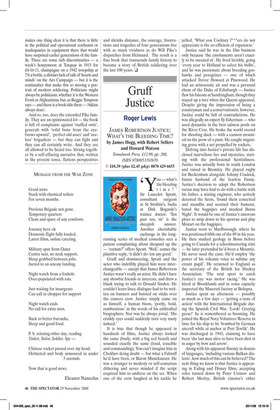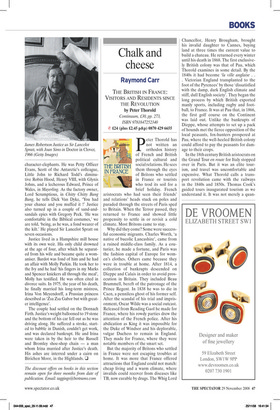Gruff Justice
Roger Lewis
JAMES ROBERTSON JUSTICE: WHAT’S THE BLEEDING TIME? by James Hogg, with Robert Sellers and Howard Watson Tomahawk Press, £12.99, pp. 208, ISBN 9780953192670 ✆ £10.39 (plus £2.45 p&p) 0870 429 6655 You — what’s the bleeding t i m e ? ’ Sir Lancelot Spratt, consultant surgeon at St Swithin’s, barks at Dirk Bogarde’s trainee doctor. ‘Ten past ten, sir’ is the sheepish answer. Another cherishable exchange in the longrunning series of medical comedies sees a patient complaining about shrapnel up the — ‘rectum?’ offers Spratt. ‘Well,’ comes the plaintive reply, ‘it didn’t do ’em any good.’ Gruff and domineering, Spratt and the actor who indelibly played him were interchangeable — except that James Robertson Justice wasn’t really an actor. He didn’t have any showbiz friends or interests, and drew a blank trying to talk to Donald Sinden. He couldn’t learn lines; dialogue had to be written on banners and hoisted on sticks over the camera crew. Justice simply came on as himself, a human bison, ‘portly, bold, rumbustious’ in the words of his enthralled biographers. Nor was he always jovial. ‘His crinkly eyes could suddenly turn very nasty indeed.’ It is true that though he appeared in hundreds of films, Justice always looked the same (burly, with a big red beard) and sounded exactly the same (loud, irascible and commanding). You can’t imagine him in Chekhov doing doubt — but what a Falstaff he’d have been, or Baron Munchausen. He was a stranger to modesty or self-conscious dithering and never minded if the script required him to undress on the set. When one of the crew laughed at his tackle he yelled, ‘What you Cockney f***ers do not appreciate is the co-efficient of expansion.’ Justice said he was in the film business only because ‘the emoluments aren’t exactly to be sneezed at’. He lived lavishly, going ‘every year to Holland to select his bulbs’, and he was passionate about breeding goshawks and peregrines — one of which attacked Trevor Howard at Pinewood. He had an aristocratic air and was a personal chum of the Duke of Edinburgh — Justice flew his falcons at Sandringham, though they stayed up a tree when the Queen appeared. Despite giving the impression of being a countryman and a conservationist, however, Justice could be full of contradictions. He was allegedly an expert fly fisherman — who used dynamite in the best salmon pools on the River Cree. He broke the world record for shooting duck — with a cannon mounted on the prow of a punt. He caught migrating geese with a net propelled by rockets.
Delving into Justice’s private life has disclosed marvellous lies and mysteries, starting with the professional Scottishness. Justice was actually born in south London and raised in Bromley. He played rugby for Beckenham alongside Johnny Cradock, future husband of the fearless Fanny. Justice’s decision to adopt the Robertson tartan may have had to do with a battle with his father, a mining engineer, who actively detested the Scots, ‘found them conceited and maudlin and scorned their humour, hated the bagpipes and mocked Burns Night’. It would be one of Justice’s amorous ploys to strip down to his sporran and play Mozart on the bagpipes.
Justice went to Marlborough, where he was positioned 68th out of the 89 in his year. He then studied geology in Bonn before going to Canada for a schoolmastering stint — he later pretended he’d been a Mountie. He never used the cane. He’d employ ‘the power of his volcanic voice to subdue any errant pupil’. He returned to England as the secretary of the British Ice Hockey Association. ‘The next sport to catch Justice’s eye was motor racing.’ He was hired at Brooklands and in some capacity inspected the Maserati factory at Bologna.
Justice spent an afternoon — possibly as much as a few days — ‘getting a taste of action’ with the International Brigade during the Spanish Civil War. ‘Look! Greylag geese!’ he is remembered as booming. He joined the Royal Navy Volunteer Reserve in time for his ship to be ‘bombed by German aircraft while at anchor at Port Tewfik’. He was discharged in 1943, claiming to have been ‘the last man alive to have been shot at in anger by bow and arrow’.
Along with his apparent fluency in dozens of languages, ‘including various Balkan dialects’, how much of this can be believed? The next thing we know is that Justice is appearing in Ealing and Disney films, accepting roles turned down by Peter Ustinov and Robert Morley, British cinema’s other character-elephants. He was Petty Officer Evans, Scott of the Antarctic’s colleague, Little John to Richard Todd’s diminutive Robin Hood, Henry VIII, with Glynis Johns, and a lecherous Edward, Prince of Wales, in Mayerling. As the factory owner, Lord Scrumptious, in Chitty Chitty Bang Bang, he tells Dick Van Dyke, ‘You had your chance and you muffed it !’ Justice also turned up in a couple of sand-andsandals epics with Gregory Peck. ‘He was comfortable in the Biblical costumes,’ we are told, ‘being, as he was, a fond wearer of the kilt.’ He played Sir Lancelot Spratt on seven occasions.
Justice lived in a Hampshire mill house with its own weir. His only child drowned at the age of four, after which he separated from his wife and became quite a womaniser. Bardot was fond of him and he had an affair with Molly Parkin. He took her to the Ivy and he had ‘his fingers in my Marks and Spencer knickers all through the meal’, Molly has testified. He was often cited in divorce suits. In 1975, the year of his death, he finally married his long-term mistress, Irina Von Meyendorff, a Prussian princess described as ‘Zsa Zsa Gabor but with greater intelligence’.
The couple had settled on the Dornach Firth. Justice’s weight ballooned to 19 stone and the bottom of his car fell out as he was driving along. He suffered a stroke, started to babble in Danish, couldn’t get work, and was declared bankrupt. He and Irina were taken in by the heir to the Russell and Bromley shoe-shop chain — a man whom Irina married after Justice’s death. His ashes are interred under a cairn on Birichen Moor, in the Highlands. q The discount offers on books in this section remain open for three months from date of publication. Email: taggings@bertrams.com



































































































 Previous page
Previous page